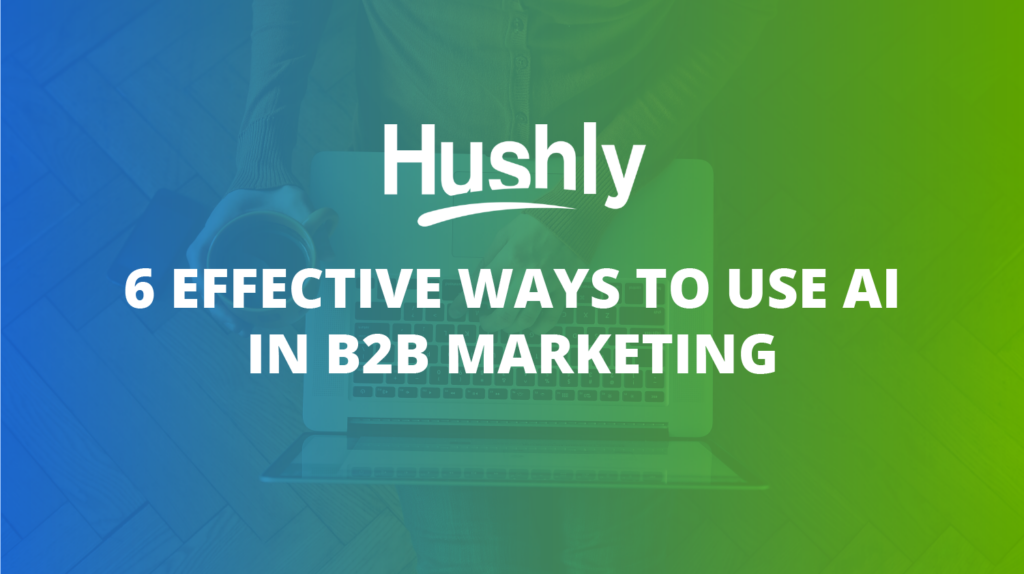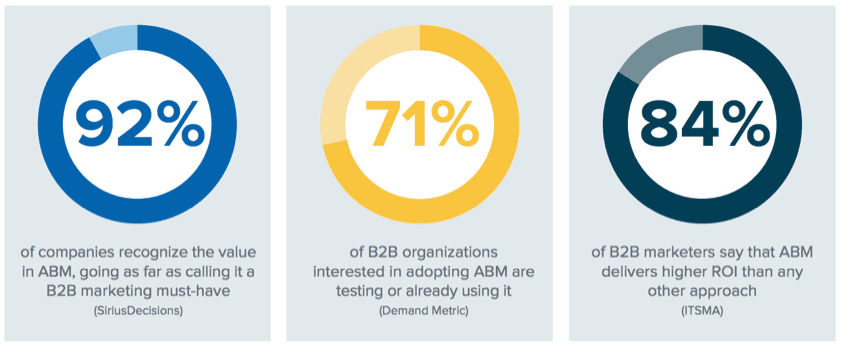Artificial intelligence isn’t the “next big thing” in B2B. It’s already here!
Top companies in every industry are already using AI in B2B marketing to learn about their audiences, segment visitors, and create personalized content.
Sure, there are still a few kinks to work out, but the results speak for themselves.
As of 2017, nearly a quarter of B2Bs had already incorporated AI into their marketing strategy, and that figure has only grown considering 83% also said AI was a top priority.
The question isn’t whether you’ll use AI in B2B for sales or lead generation, but how.

How to Use AI in B2B Marketing for Lead Generation and Sales
AI can feel intimidating. You’re taking control out of the hands of humans and putting it in computers and code.
What if the software is wrong? What if your predictions fail or if you lose money?
Start small with easy solutions to automate, such as email and content recommendations. AI in B2B marketing makes humans work faster and more efficiently when done right.
Automated Email Marketing
Email marketing might be the easiest place to incorporate AI into your B2B marketing strategy.
First, email service providers make it easy to set up automated campaigns. For B2B nurturing, this is awesome. You can design personalized welcome emails, onboarding, and even newsletters to deliver super-relevant content to your subscribers.
41% of B2B buyers say email is their favorite channel to communicate with brands. Meanwhile, 75% of marketers say email is their favorite personalization channel.
Email also makes it easy to segment your audience because data is so organized and plentiful. You can also combine data from your CRM software and other sources to build detailed profiles on your leads for hyper-personalized email campaigns.
These personalization features make email an awesome tool for account-based marketing strategies as well.
Account-Based Marketing Segmentation
92% of companies see account-based marketing as valuable. Some even call it a must-have!
But ABM is tricky. If your intelligence is off, it can render your entire content strategy moot.

Source: Smart Insights
Sadly, statistics show that most businesses aren’t working with accurate data to guide their marketing decisions. 62% of brands rely on data that is up to 40% incorrect to build their strategies. It’s no surprise that 40% of initiatives fail due to bad intel.
AI in B2B marketing removes bad data from the equation because much of the data collection, interpretation, and content recommendations happen in real-time.
Not only can AI offer personalized ABM recommendations, but it can also help you segment your list by company. Instead of collecting data on your leads through clunky forms, AI scans publicly available information on sources like LinkedIn to piece together a broad range of firmographics.
Personalized Content Recommendations
AI in B2B marketing is perhaps most impactful for offering personalized content recommendations to every visitor – whether known or unknown.
When you activate an AI engine on your website, it monitors the behavior of every visitor, taking a record of everything they read, how long they read each post, what they navigate to next, and other factors.
From there, the AI system can build complex profiles and make recommendations for future visitors based on their behavior and the behavior of past visitors.
AI is especially effective for nurturing because the buying process is so fluid. An average of seven team members are involved in each sales decision, and company needs change. AI can take data and offer a personalized experience in real-time.
Humans, on the other hand, must work retroactively sorting through old datasets and following up with personalized content for lead nurturing.
Effective Exit-Intent Strategies
Exit-intent popups are effective but sadly, most brands get them wrong.
How many times have you visited an interesting blog today only to have a lead form thrown at you as soon as you tried to navigate away from the tab?
No one likes to fill out forms – especially on mobile devices.
Well, Think with Google estimates that 70% of all B2B searches happen on mobile devices, and buyers spend up to three hours each day researching from their mobile devices.
Instead of confronting your visitors with a form, AI lets you offer them personalized content recommendations. Not only does this leave a better taste in their mouth, but it also helps leads self-nurture instead of leaving your page.
Chatbots for AI in Lead Generation and Nurturing
Chatbots are another easy place to play with AI in your B2B marketing strategy.
The AI used in chatbots has improved over the past few years tremendously, and it gets better the longer you use it on your own site as well.
No one is sure how much of the buying process B2Bs complete online without speaking to anyone at a company. However, we do know that the figure ranges from 57% to 90%.
That means you control less than half – or much less.
Chatbots make it easy for buyers to ask quick questions about your product and get answers instantly without committing to anything.
Netflix-Style Content Bingeing for AI in B2B Marketing
Think your buyers don’t want to binge content on your B2B site? Think again.
Buyers and decision-makers are young and they want to research content at their own pace. Research shows that 42% of millennials working at B2B companies are in managerial-level positions while another 21% are in C-suite roles.
Younger generations expect personalized content everywhere online, so B2Bs need to keep up. They know these algorithms exist and they expect professional sites to use them.
Content bingeing powered by AI can help them find the information they want in less time. Plus, personalized recommendations are designed to guide buyers along the sales cycle, depending on the stage they’re at.
Incorporate AI in B2B Marketing and Watch Leads Skyrocket
By incorporating Hushly AI into your website, you can skyrocket lead conversions by 51%. Hushly’s system uses data you’re already collecting to provide real-time content recommendations and guide visitors down the nurturing process – whether known or unknown.




